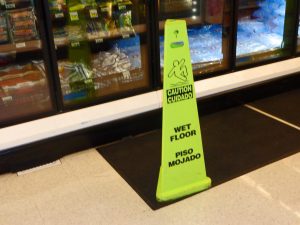- Free Consultation: 401-552-5000 Tap Here To Call Us
Study Finds Common Culprit in Slip & Fall Accidents

It’s not often that we take the time to look down when we’re walking down the sidewalk, in a parking lot, or into our local big box store. After all, Rhode Islanders are busy people, why would we bother looking at the ground when we’ve got so much to do? Well, you may re-think this next time you’re headed out to the store. A recent report by CNA, an insurance and risk management services provider for businesses and professionals worldwide, revealed that half of all flooring they surveyed at test sites does not meet the minimum threshold for adequate friction. Simply put, the flooring being used in many places of business is not as safe and slip-proof as it should be. Ironically, most large businesses have fall prevention programs in place to combat slip and fall accidents and prevent injuries in their businesses, such as maintenance staff to mop up spills quickly, but often fail to address the actual flooring surface selection. The personal injury attorneys at Providence-based Tapalian Law have helped clients in Rhode Island and Massachusetts who have been hurt in a slip and fall accident.
Where Do Slip & Fall Accidents Occur the Most?
According to the CNA study of slip and fall liability claims occurring from January 1, 2010 to December 31, 2016, retail and real estate businesses present the greatest potential for slip and fall accidents. Injuries occurred most often at these sites:
- 40% on walking/working surfaces, mainly entry flooring
- 33% on parking lot surfaces
- 27% on sidewalks leading to business entrances
- Less than 1% on interior office floors
The report showed high-frequency/low-severity trends with the claims they reviewed. That means that slip and falls take place frequently, but are often low in severity and don’t often result in serious injuries. Despite this, severe injury can, and does, still occur during slip and fall accidents. Severe personal injury from a slip and fall may include traumatic brain injuries (TBI) a broken hip, or bone fractures. Less grave personal injury may include sprained or sore muscles.
Potential Slip & Fall Hazards
Business owners, and home owners alike, should be aware of potential slip and fall hazards at home and at work. Negligence can not only result in someone getting hurt, but also a costly lawsuit.
- Wet Floors and Walkways
- Take care to clean up spills or puddles immediately.
- Ice & Snow
- Snow and ice should be properly removed from pathways, steps, sidewalks, parking lots and walkways. A snow removal aid like salt should be spread and the area monitored for further follow-up care.
- Damaged Flooring & Rugs
- Flooring should be regularly inspected for any frayed or upturned edges, or broken tiles, that are potential tripping hazards.
- Choose Flooring Materials Wisely
- If you often entertain visitors at your home or have clients coming into your office, be cognizant of the flooring you use in the entry way especially in order to avoid slip and fall hazards. If the flooring is overly slippery or high-gloss, take extra precautions by using non-slip treads or non-slip tape or a tightly secured non-slip textured entry rug.
Contact Tapalian Law if You’ve Been Hurt in Slip & Fall Accident
If you, or a loved one, has been seriously injured in a slip and fall accident on a property owned by another person or business, you may be eligible to seek compensation for your accident. With the aid of a skilled Providence personal injury attorney, you must prove that the slip and fall was the fault of the property owner’s negligence. Examples of negligence in a slip and fall may include icy or snowy walkways, broken stair treads, a cracked sidewalk, or spilled liquids left on the floor for a period of time, among other risk factors. Tapalian Law advocates for victims of personal injury due to another’s negligence including slip and fall accidents, car accidents, motorcycle accidents, and medical malpractice. Contact slip and fall attorney David Tapalian today for a free case review of your Rhode Island or Massachusetts personal injury claim. Call us at 401-552-5000 or reach us via our website.







